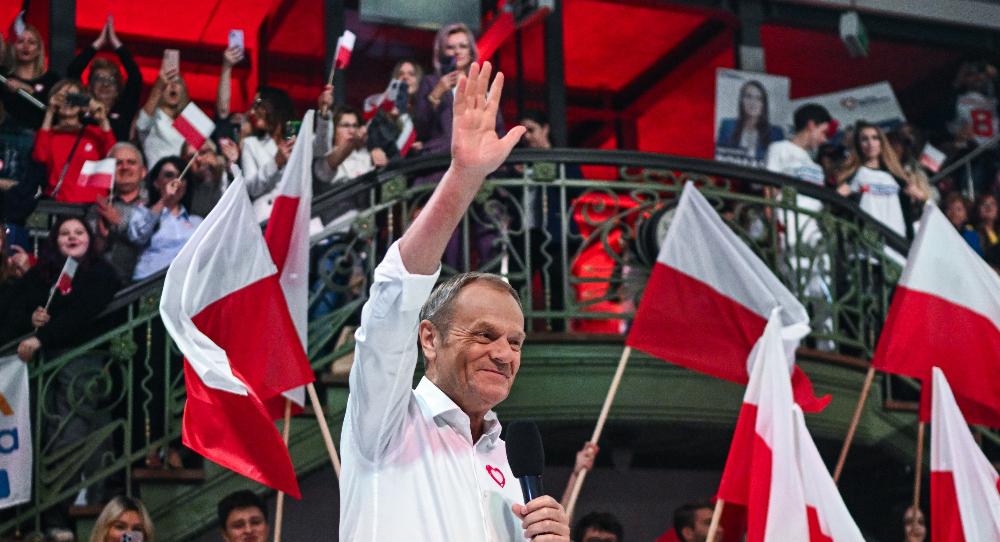As European leadership prepares for the sixteenth EU-India Summit, both sides must reckon with trade-offs in order to secure a mutually beneficial Free Trade Agreement.
Dinakar Peri
{
"authors": [
"Judy Dempsey"
],
"type": "commentary",
"blog": "Strategic Europe",
"centerAffiliationAll": "",
"centers": [
"Carnegie Endowment for International Peace",
"Carnegie Europe"
],
"collections": [],
"englishNewsletterAll": "",
"nonEnglishNewsletterAll": "",
"primaryCenter": "Carnegie Europe",
"programAffiliation": "",
"programs": [],
"projects": [],
"regions": [
"Europe",
"Eastern Europe",
"Western Europe"
],
"topics": [
"EU",
"Democracy",
"Political Reform"
]
}
With over 99 percent of the votes counted, Poland is poised to have a new centrist government. Warsaw’s new leadership has a great chance to restore the rule of law, end the country’s bitter polarization, and revive its influence in Europe.
After eight years in power, Poland’s conservative Law and Justice (PiS) party has been defeated by the centrist Civic Coalition (KO) in Sunday’s parliamentary election.
Even though PiS won the most votes (35.4 percent), it lost its parliamentary majority. KO, which ranked second at the polls, will be able to form a government with two other opposition parties, the centrist Third Way and The Left. The turnout was a whopping 74 percent, the highest since 1989, when the communist regime was ousted.
The results are good news for Poland, good news for the European Union, and bad news for populist parties—especially for Viktor Orbán’s Fidesz government in Hungary. Orbán has lost a useful Eurosceptic ally.
It is good news for Poland, the EU’s fifth largest member, because this election was about the future of its democracy.
“Poland won. Democracy has won,” said a jubilant Donald Tusk, the leader of KO and Poland’s former prime minister.
Since it came to power in 2015, PiS has systematically undermined the rule of law and the independence of the judiciary. It dismissed judges. It ran roughshod over the Constitutional Court. It interfered in the appointment of public prosecutors.
That wasn’t all. The longer it was in power, the more PiS got involved in the management of state enterprises. Corruption spread. Large parts of the media were influenced if not under the control of the ruling party.
As for women’s rights, especially the right to abortion, they became severely restricted as the government and the Catholic Church moved Poland in the direction of a highly conservative country.
But it was the way in which PiS tried to shackle the judiciary that put it on a collision course with the EU. For several years, independent lawyers, civil society activists, and a disorganized opposition warned the EU about the incremental erosion of democracy in Poland.
Brussels dragged its feet over taking action. This only emboldened parties like PiS and Fidesz to continue promoting a political agenda that denigrated the rule of law. In their views, it was about stopping the EU from interfering in their national sovereignty. In reality, it was about reducing accountability so as to increase their powers.
Finally, as a means to put pressure on both countries, the EU withheld Poland’s €35-billion share of the union’s Covid recovery fund until Warsaw moved toward restoring an independent judiciary. As new judicial legislation is held up for review by the Polish Constitutional Court, a change of government could help unlocking those much-needed funds.
Even though PiS has acknowledged the electoral defeat, don’t expect any smooth transition to KO and its allies, or a swift return to the rule of law.
President Andrzej Duda, who is supposed to be independent but has been in office with the support of PiS and has two more years to serve, has the authority to invite the party who won the most votes to form the next government.
The number of seats in the Sejm, the lower house of the Polish parliament, doesn’t give PiS and its ally, Confederation, enough to establish anything that resembles a stable coalition, let alone a majority.
Duda can then turn to KO. Tusk has his work cut out. For one thing, Duda could obstruct KO’s plans to overturn PiS’s judicial decisions. Furthermore, Tusk’s political allies consist of young people who want to see new faces in power and an invigorated Poland that is inclusive and can retain its influence and status in the EU.
The latter shouldn’t be insurmountable. Indeed, a KO-led government should give its ideas about EU’s future direction, particularly on foreign policy, defense, and security.
Despite PiS’s consistent political and until recently military support for Ukraine and its hospitability towards nearly one million Ukrainian refugees, its Eurosceptic stance and its assault on the rule of law deprived Warsaw of a more influential role in Brussels at a time of unprecedented challenges facing the EU.
And just as important for the EU, a KO-led coalition could give centrist, conservative, and liberal parties a fillip. The results of Poland’s election show that nationalist, Euroskeptic governments such as those of Hungary and Slovakia need not be a permanent and divisive feature of European politics.
Whether or not Duda drags his feet on putting a new government in place, a new opposition government will have two immense domestic tasks to deal with.
One is to restore public trust in the institutions that were so undermined by PiS. The other is about ending the bitter, dangerous polarization that has characterized Poland for several years. During that time, the space for the middle ground, for the center, was so narrow and so marginalized that it almost disappeared. KO and the young people who voted for change have the great chance to end this vilification—and give Poland back its place in the EU.
Carnegie does not take institutional positions on public policy issues; the views represented herein are those of the author(s) and do not necessarily reflect the views of Carnegie, its staff, or its trustees.
As European leadership prepares for the sixteenth EU-India Summit, both sides must reckon with trade-offs in order to secure a mutually beneficial Free Trade Agreement.

Dinakar Peri
The hyper-personalized new version of global sphere-of-influence politics that Donald Trump wants will fail, as it did for Russia. In the meantime, Europe must still deal with a disruptive former ally determined to break the rules.

Thomas de Waal
2026 has started in crisis, as the actions of unpredictable leaders shape an increasingly volatile global environment. To shift from crisis response to strategic foresight, what under-the-radar issues should the EU prepare for in the coming year?

Thomas de Waal
A renewal of relations between France and Turkey is vital to strengthen European strategic autonomy. To make this détente a reality, Paris and Ankara should move beyond personal friction and jointly engage with questions of Black Sea security.

Romain Le Quiniou
Europe is designing a new model of collective security that no longer relies on the United States. For this effort to succeed, solidarity between member states that have different threat perceptions is vital.

Erik Jones